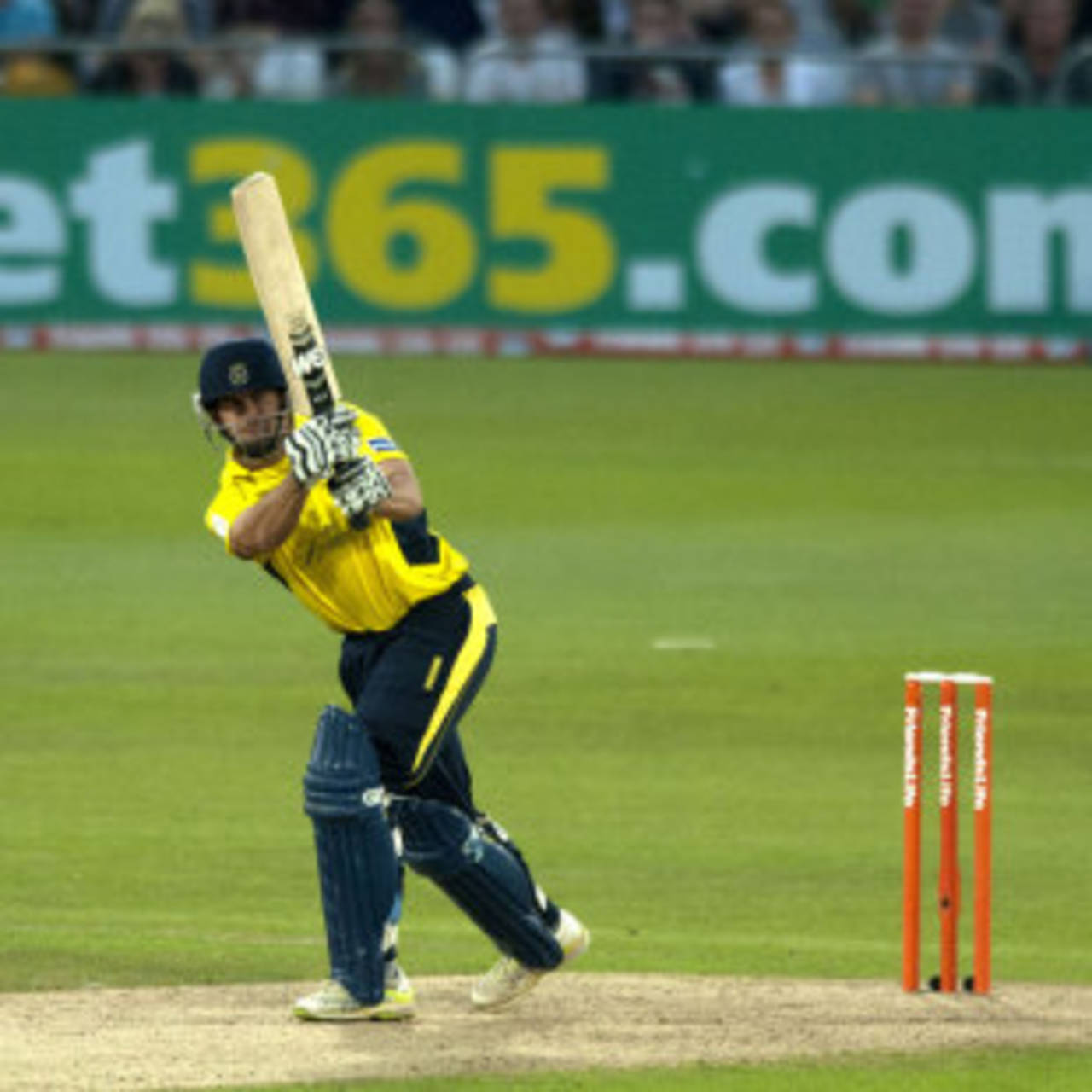Domestic greatness beckons in Mascarenhas finale
Hampshire know how to win and have mastered the art of a successful T20. Two more victories would provide a fitting leaving gift for one of their stalwarts
Freddie Wilde
Aug 15, 2013, 1:41 PM

Neil McKenzie has been Hampshire's MS Dhoni • PA Photos
As followers of cricket we like to believe that our sport is dictated to by sparks of genius and flashes of inspiration, and of course cricket remains susceptible to such natural rhythms. But in the modern age those influences are increasingly being marginalised with analysis and methodology drastically altering the science of the sport.
This change began with the death of amateurism in the 1960s, but the birth and proliferation of T20 cricket has further intensified its development. As the T20 format has grown teams have become more attuned to the secrets of success. Consistency has emerged to be the leitmotif of triumph - consistency of selection, of roles and of methods.
There are various methods to win in T20, but once a team has formulated one, isolating a small group of players and defining roles within that group is paramount to long-term success. Hampshire have now reached at least the quarter-final stage of the Friends Life t20 for five consecutive seasons and will appear on Finals Day for the fourth straight year at Edgbaston.
Like the enormously successful IPL franchise Chennai Super Kings, Hampshire's success is rooted in unwavering stability and a method they have confidence in. In 2013 Hampshire have picked just 13 players - which is fewer than any other team. Seven players have been selected for every match this year, and only six changes have been made to the playing XI all season.
Hampshire have had the same top three - Michael Carberry, James Vince and Jimmy Adams - for every fixture this season. Their role has been to build a platform for the lower order to launch from. The foundations they have regularly laid have been clinically utilised by the middle order of Liam Dawson and Sean Ervine who have played every match, and McKenzie who averages 148 in this year's competition.
The development of the role of the lower-order hitter during T20's existence has been fascinating and is now surprisingly subtle as opposed to the mindless slogging that many envisaged.
In recent times an increasing number of batsmen appear to be "eating up" balls at the beginning of their innings by taking time to get used to the nature of the pitch, to get their feet moving and eyes accustomed to pace of the bowling. This strategy may appear high risk but is becoming progressively apparent that this time taken at the beginning of an innings is vital to the regularity of the explosive cameos being played.
Mahendra Singh Dhoni is a master of such an innings, and McKenzie has become Hampshire's equivalent. During his Hampshire career, 77% of McKenzie's fifties result in a victory and on 13 of the 15 times he has remained not out Hampshire have won.
Hampshire's dominance extends further than their batting. Their versatile attack of Dimitri Mascarenhas, Sohail Tanvir, Chris Wood and Danny Briggs have appeared together in seven of their eleven matches. Just as it does with the batting, when team selection is so stable, the players quickly become aware of their roles and fulfilling them becomes routine.
Their strength with the ball lies largely in the "middle-over squeeze" where the spin duo of Briggs and Dawson, combined with Hampshire's excellent fielding (they're a relatively young side) strangles their opponent's innings.
This season between the sixth and the sixteenth over Hampshire on average concede an impressive 70 for 3. Earlier in the season against Kent they conceded just 55 runs and took five wickets in that ten over period and in their first game against Surrey took 4 for 53. With the impetus on rotating the strike and keeping wickets in hand that is a dangerous period for the batting side.
Yet Hampshire's method is not without flaws. Adam Wheater has taken the gloves for the majority of this season and his batting is an improvement on Michael Bates's. But Bates's superb glove-work was expected to be utilised more than it has been in a format that requires specialisation more than depth.
Hampshire will be the most confident of the teams at Finals Day having beaten their semi-final opponents Surrey convincingly in both fixtures earlier this season. What's more, neither Northamptonshire nor Essex, who meet in the day's first semi-final, have ever reached the final, let alone won it. Furthermore, the eventual winners of the tournament for the past four seasons have all emerged from the second semi-final of the day, which on Saturday is Hampshire versus Surrey.
The statistics, form and logic favour Hampshire - but while the influences of individual brilliance can be mitigated by rigorous planning they can only do so up to a point. As has been the case throughout the history of cricket, an innings of staggering brilliance or a spell of destructive mastery can derail even the best laid plans.
Two wins on Saturday will see Hampshire become the first side ever to defend a Friends Life t20 title. In what will be Mascarenhas' final day as a Hampshire T20 player and the end of an era: domestic greatness beckons.
Freddie Wilde is a teenage blogger based in Hampshire who first played cricket at the age of seven. He tweets here